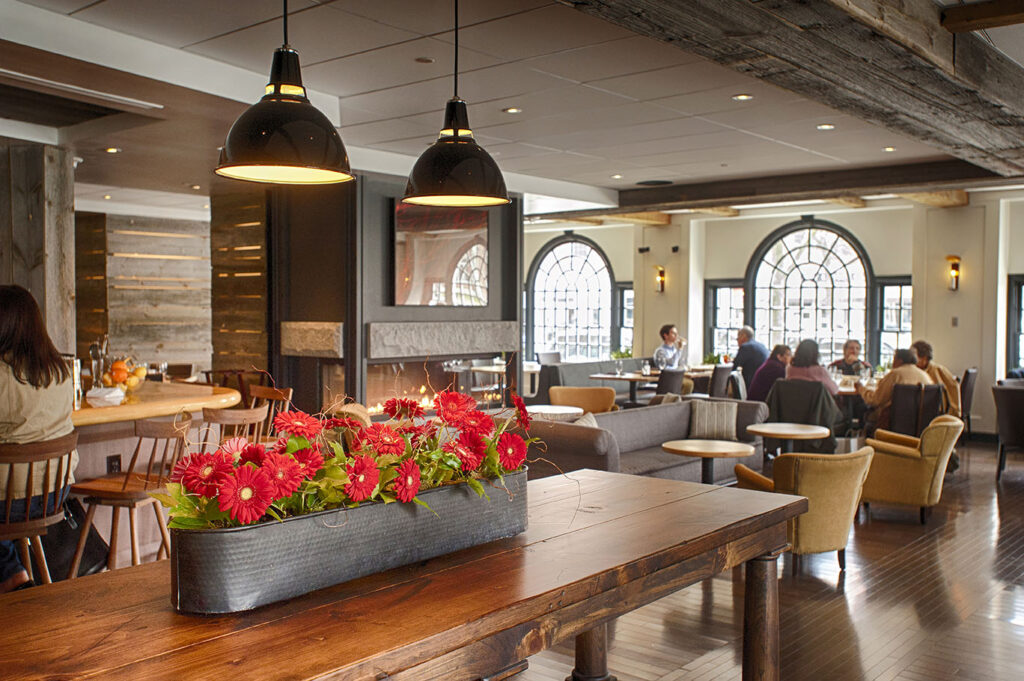
I had never been to Pine for dinner before. In the evening, the restaurant transforms into something entirely unfamiliar to those who might recognize it during the day. The lights: considerably dimmed, more sophisticated. The waiters: actually of the quality that the price tags demand, helpful but never overbearing. The prices increase, even for dishes that remain unchanged (the same salmon goes up in price by $3, an “evening tax”, I suppose).
One gets the palpable sense that all in the restaurant are more austere than those in the daytime crowd. The guests are outfitted in the standard dress of the elite: an Oxford shirt under a cashmere sweater, likely the outfit donned after a game of squash with a father-in-law.
There is a distinct sense amongst the guests there that yes, I have made it (or more likely, given the status of generational wealth at Dartmouth, I have continued it). In Hanover, however, what does this accomplishment truly amount to? Drinking an overpriced bourbon cocktail on a Friday night while herds of college students scamper along across the Green?
We used to live, as a society, for some semblance of glory. One yearned for something beyond material wealth and status. In response to Gordon Gekko—greed was not good.
The food was alright. For my health, and strength training, I have taken to “bulking.” I now think of food in terms of its protein content rather than its taste. The halibut satisfied both qualities for me. I will confess that “sophisticated” food does not do much for me. Food is fuel. Our hunter-gatherer ancestors thought nothing about the cut of the mastodon they were eating, because eating is a bodily function.
I noticed everyone around me sitting with rigid posture, carefully placing their napkins on their laps, choosing the correct forks. Conservatives speak about politics in terms of civilization and barbarism. Manners are the exoteric lie on top of civilization. They are a silly virtue at best. Excessive attention to their practice is for the effete. As I was eating, I made every faux pas, I think, that is possible. Using the wrong knife for butter, putting the tip on the guests’, not the merchant’s receipt, frequently requesting a refill of water, et cetera. But who cares?
I know what I am doing here, but why are you eating here? There were some alum-looking fellows probably in town for the weekend, I will grant you. But the others? There seemed to be an infinite supply of sweater-wearing 62-year-olds ready to drink themselves into exhaustion. What is the background behind these Upper Valley elite? Are they, too, just passing by? Surely not, for their physiognomies reflect many winters spent in the Granite State. Are they professors? Do they work at Dartmouth-Hitchcock?
Nearby, in Lebanon, one can get food for one-tenth of the price. Some of this is due to pure evil. While Thomas Friedman may see the McDonald’s arches as a sign of globalization, I see them as a destruction of the national character. Nevertheless, one can still find a restaurant, any restaurant, that is cheaper and tastier. The key part, as well, is that this “other” restaurant is better.
This is not a reactionary argument. There is no one listening to the cries of “we must return!” Indeed, much of the Dartmouth Outing Club gets it right, focusing on the outdoors rather than college life. However, the problem is that somehow the DOC has been rearranged into the DEI. One must find other outlets. We were born standing up, and now we are given office jobs which befit only the most frail of our society. Something is seriously wrong.
My experience at Pine made me long for the diners of rural Michigan. There, construction workers, farmers, and motorcycle repair men all come together over a watery cup of coffee, some eggs, and toast. It says something deeply disturbing about our society that blue-collar is largely a pejorative.
Lest someone read this argument the wrong way, I indeed appreciate many things about the free market. Those who complain, especially the fake Marxists of the English, Sociology, and Geography departments, fail to realize how they likely would not even exist if not for the absurd amount of wealth produced since the onset of the Industrial Revolution. But judgment is something sorely lacking in this era, and I see this culture and frown. There is much work to do.

Be the first to comment on "The Hanoverian Oligarcy"